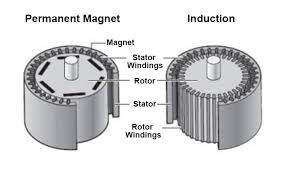New EV motor said to cut need for rare-earth neodymium magnets
TOKYO -- Japanese metal maker Proterial has developed a prototype motor for electric vehicles that uses magnets that do not contain the rare-earth metal neodymium.
Neodymium magnets are the most common type currently employed in EV motors, but since the main source of the rare earth is China, stable procurement has been an issue.
The new magnet is mainly composed of ferrite. Tests of the prototype have confirmed that the motor output necessary for EVs can be achieved, the company said.
Proterial, formerly known as Hitachi Metals, said last year that computer simulations had confirmed that ferrite magnets, which are primarily composed of iron oxide, can be used in EV motors. The company has since developed a prototype motor for EVs that utilizes those magnets and has used it to conduct performance tests.
Ferrite magnets are only about one-tenth the strength of neodymium magnets, and until now have not been used in the major types of EV motors. Proterial said it has developed a technology to increase the output of a motor through a novel arrangement of the magnets. Tests with prototypes have confirmed that output usable for EVs can be obtained.
Proterial does not intend to mass-produce its own motors, but only to sell ferrite magnets and other materials to motor manufacturers seeking to reduce the risk of being denied access to rare earths. It plans to pursue sales activities with the aim of reaching full-scale adoption in EVs by the early 2030s.

CATEGORIES
LATEST NEWS
CONTACT US
Contact: Daniel Wong
Phone: +86-18072358327
Tel: +86-18072358327
Email: info@delugepower.com
Add: YIWU County, Zhejiang Province, China
